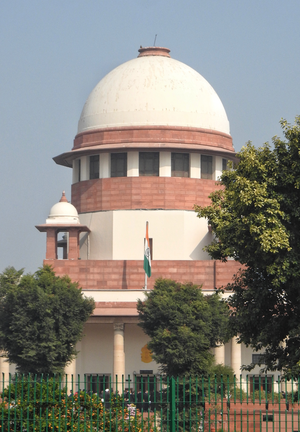New Delhi: Taking a tough stand against unchecked entry of polluting trucks into Delhi, the Supreme Court on Friday hinted at asking the police to set up checkpoints at all 113 entry points to turn back non-essential vehicles and appointed 13 lawyers, one each for the 13 major border entry points, to assess compliance with its earlier directions.
A Bench of Justices Abhay S Oka and Augustine George Masih appointed the 13 court commissioners and sought CCTV footage from the 13 major entry points to assess if polluting trucks were actually stopped from entering the city after April 18, the day the apex court ordered the tough measure.
Asking the court commissioners to take photographs and submit a report by November 25, the apex court extended the Graded Response Action Plan (GRAP-IV) for another 72 hours in the backdrop of “very poor” quality air in the city on Friday. The matter will next be heard on November 25.
While hearing a matter on anti-pollution measures by the ruling Aam Aadmi Party and the police, the Bench questioned the Delhi government on details of its curbs on trucks.
“Tell us how you are stopping the entry of trucks?” it asked.
The apex court decided to send its representatives to the 13 key entry points after the Delhi government failed to provide a list of all entry points, even as its counsel claimed that non-essential trucks were not being allowed into the city.
“This is meaningless if you’re not providing the list of the entry points. It cannot be verified,” the court said, adding that it was difficult for it to assume that entry of polluting trucks had been stopped.
Earlier, the apex court said GRAP-IV would remain in place even if Delhi’s AQI were to fall below 450, the level at which the fourth stage and stricter anti-pollution measures kick in.
GRAP-IV measures include restrictions on operation of Delhi-registered BS-IV, and older, diesel-operated medium goods vehicles (MGVs) and shifting of schools to an online mode.
Office timings are also staggered, apart from encouraging office-goers to use public transport.
The apex court had earlier pulled up the authorities for their failure to enforce the ban on firecrackers during Diwali, singling out the Commission for Air Quality Management (CAQM) for failure to take adequate steps to fight air pollution.
The GRAP for the National Capital Region (NCR) has four stages depending upon the drop in air quality. Stage I kicks in when there is “poor” air quality (AQI 201-300); Stage II comes in when the air quality is “very poor” (AQI 301-400); Stage III kicks in when air quality is “severe” (AQI 401-450); and Stage IV come into force under “severe plus” air quality (AQI >450).
–IANS


Comments are closed.